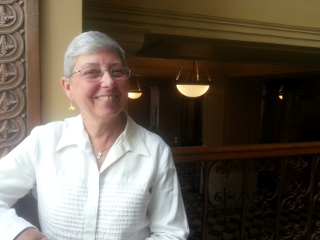Taking a page from job-training nonprofits like Janus Youth and Goodwill Industries, Portland’s Community Cycling Center is preparing to create a new enterprise that supports its mission of making bikes more accessible.
It’s considering a fee-for-service job training operation that would give underprivileged Portlanders a ladder into Portland’s rapidly expanding universe of bike mechanics, builders and component manufacturers.
“The bicycle industry is not a diversified industry, and we believe that it should be,” said Anne Lee, operations director for the 19-year-old nonprofit. “We’re trying to create access in a new way. … It’s not just access to being able to ride a bicycle, but it’s access to the bicycle industry and the jobs that are there.”
The new business model is still on the drawing board — it’s not clear who’d pay whom for what, or how much. The next milestone is an Oct. 25 conversation with local industry leaders. But Lee said there’s been enough interest from early conversations for the CCC to announce the new project in a recent blog post on its site.
For example, Lee described a business model that might include the CCC entering into bike-building contracts with other local shops, to smooth the seasonality of their workforces.
“Bike shops generally will lay people off in the winter,” she said. “And they need to at some point build up the bikes they’re going to sell next year. So if we could provide some opportunities that would let us build bikes for them, then they would be able to sell more, so they would be able to have more hands during their high season.”
The Community Cycling Center dedicates more than half its budget to community programs like the “create a commuter” bike education classes and the awesome bike skills park it helped create in North Portland’s New Columbia development. But the CCC is probably best known in Portland for its break-even bike shop on NE Alberta at 17th, one of the best places in town to buy a decent refurbished bicycle.

(Photo: M.Andersen/BikePortland)
“CCC has always been in the job creation business; It’s part of what we do,” Lee said. “So this is really an extension of our general business model.”
Lee took care to note that CCC isn’t setting out to compete with operations like the United Bicycle Institute, the Portland-based bike mechanics’ school. If anything, she said, “we would be a starting program for people to move on to UBI.”
Portland’s bike industry represents tens of millions of dollars in the region. The most complete assessment, back in 2006, estimated its value at $63 million.
If enough local companies express interest in one or several of the CCC’s concepts, the nonprofit hopes to pursue grants and donations that could finance the new program’s startup as soon as 2014. Charitable, foundation and government support might continue to be part of the picture, but in general — as with its bike shop — the CCC sees this venture as self-financing.
“Every business has a gap; they buy something from somewhere,” Lee said. The CCC’s new venture, like any other, is an attempt to fill gaps its leaders see in the marketplace. “We’re trying to make that match with what we do well.”





Thanks for reading.
BikePortland has served this community with independent community journalism since 2005. We rely on subscriptions from readers like you to survive. Your financial support is vital in keeping this valuable resource alive and well.
Please subscribe today to strengthen and expand our work.
This doesn’t sound like a program that is beneficial for those folks who are already bike mechanics. They’re going to take work away from people who have been laid off and encourage shops to lay off more people in the winter? By adding more workers to a market that is already saturated and already lays off a significant amount of its staff seasonally it will devalue bike labor even more. Some people may think the bike industry is getting rich, but I assure you the mechanics aren’t.
I think it would be a great idea to have a cheaper version of UBI, but the proposed model sounds like it would be damaging to those already in the industry, and damaging to those seeking to enter the industry. Bike shops should build their own bikes, its one of the things that differentiates them from one another and department stores.
Our focus isn’t on creating the best bike mechanics, it’s about creating good jobs with liveable wages for underserved community members. The skill sets they will learn will be transferable to other industries, not just the bicycle industry. Bike mechanics may be one skill set, retail, administrative experience, etc. may be other avenues that we pursue. This initiative is about opening up access to jobs. Defining the jobs and skills sets that we will provide training for is something that is yet to be determined. We will be meeting with industry leaders to determine the focus of the skills training.
Or making biking more accessible pays dividends over and above the current stock of bike jobs. The more that Portland becomes the place where anyone can bike, the better all bike industry will do.
Better to have seasonal jobs, then no jobs at all. Depending on how the jobs are structured, wouldn’t some of the people subject to lay-offs be eligible for unemployment compensation?
What, so bike mechanics don’t work cheap enough yet?
It is two folds. One, we need the infrastructure to get more people on bikes. Two, create a culture where weather has little to no impact so that people will not risk being laid off or hrs cut back. Then, the industry will be more robust. It’s a little marketing, and a whole lot of creating an urban cycling experience that reaches the interested but concerned.
Here’s how it should be done.
http://dreambikesmadison.blogspot.com/p/home.html